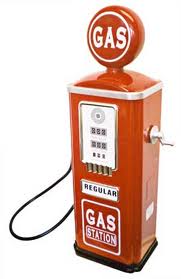Is Raising Gasoline Taxes Fiscally Conservative
Is Raising Gasoline Taxes Fiscally Conservative

What Does Fiscally Conservative Actually Mean?
Is raising taxes fiscally Conservative? This article takes a look at this issue from a different angle.
Raising taxes has become a highly charged political issue in the United States in recent years. While nobody likes to have their taxes raised, there are situations in which raising taxes is actually the fiscally conservative approach to financing government services and can save a great deal of money in the long run.
There is general agreement in American society that government has a legitimate role in building and maintaining transportation infrastructure, such as roads and mass transit systems. The questions that must be resolved is how much publicly financed transportation infrastructure does society want to build and maintain and how will the construction and maintenance of the transportation infrastructure be paid for in a fiscally responsible manner?
Is Raising Gasoline Taxes Fiscally Conservative | Pay Now or Pay More Later
Libertarians may argue that government has no business building or maintaining transportation infrastructure and such activities should be done exclusively by private entities. That is fine if you want to have a tollbooth on every street that you travel on to pay a private entity for the use of their private roadway; most people would find that extremely cumbersome and unworkable in our modern society that relies upon moving people and goods around quickly. That debate is beyond the scope of this article and moot since the vast majority of Americans support government involvement in building and maintaining transportation infrastructure, and such support is unlikely to change in a society that values its freedom of movement without the hindrance of stopping to pay tolls. They call highways without tolls “freeways” for that very reason. Also, collecting revenue via tolls is very inefficient and expensive when compared to a motor fuels “gas tax” collection system that is done invisibly at the gas pump and paid by the retailers of motor fuels, such as gasoline and diesel.
I will use the State of New Jersey as an example regarding why raising motor fuel taxes and paying for transportation infrastructure construction and maintenance up front is the fiscally conservative approach. Due to decades of borrowing in the bond markets to pay for transportation infrastructure construction and maintenance, New Jersey is currently paying nearly $900 Million per year from state motor fuel taxes and transportation fees just to pay off transportation bond debts that the state ran up in past decades. None of the money that New Jersey currently collects for transportation infrastructure construction and maintenance is used for its intended purpose. The nearly $900 Million collected by the state in gasoline and other fuel taxes for transportation infrastructure projects is instead being used entirely to service past bond debts.
If New Jersey had paid for transportation infrastructure construction and maintenance projects over the past few decades up front on a “pay as you go” basis via gas and fuel tax increases, when necessary, instead of borrowing to pay for them in the bond markets, the state would now have nearly $900 Million more per year to pay for transportation infrastructure projects. In other words, if past state governments in New Jersey were fiscally conservative and paid for transportation infrastructure projects up front rather than borrowing for them and saddling future generations with the payment of their debts (which is now), the state would have at least $900 Million more per year to dedicate to these projects. That is an astounding amount of money when the total amount of money the state of New Jersey spent on transportation infrastructure construction and maintenance projects in 2011 was $1.6 Billion. In percentage terms, 56% of the money New Jersey currently requires for transportation infrastructure construction and maintenance projects is instead being used to service the debt of past transportation bond issues. This annual shortfall in money for transportation projects is made up by even more borrowing in the debt markets; a situation that is snowballing into a large and unsustainable debt burden.
The motor fuels tax “gas tax” in New Jersey is currently 10.5 cents per gallon. That is the third lowest gas tax in the United States. The gas tax in New Jersey has not been increased since 1988. Back in 1988, gasoline was selling for approximately $1.00 per gallon, so the gas tax as a percentage of a gallon of gasoline was approximately 10%. With gasoline currently retailing for approximately $3.35 per gallon, the same 10.5 cents per gallon is only slightly more than 3% of the cost of a gallon of gasoline in New Jersey. If New Jersey’s gas tax was a percentage of the price of a gallon of gasoline over the years since 1988, instead of a fixed 10.5 cents per gallon, there would be plenty of money to pay for transportation infrastructure construction and maintenance projects on a pay as you go basis and very little, if any, need for borrowing to pay for transportation infrastructure.
New Jersey has dug itself into such a deep debt hole that it would take a 15 cents per gallon increase in the New Jersey gas tax to make up for the nearly $900 Million being used to service the past transportation bond debt. While a 15 cents per gallon increase in the New Jersey gas tax sounds large, it would only bring New Jersey up to the same gas tax rate as neighboring New York, and New Jersey would only be in the middle of the pack in comparison to the gas tax levies that other states impose. Also, as a percentage of a gallon of gasoline, New Jersey’s 25.5 cents gas tax would be 7.6% of the cost of the cost of a gallon of gasoline at current gasoline prices; well below the percentage that was paid in 1988.
Think of Paying With Cash Versus Debt on a Personal Level
Nobody would argue that personally paying for everything on a credit card until all of one’s income is used to pay for interest on the credit card makes any sense from a personal fiscally conservative point of view. The same fiscally conservative principal applies to states that need to finance necessary transportation infrastructure projects to keep people and goods moving and their economies healthy. Paying for things up front is always cheaper then financing them, no matter if you are an individual or a large government body like a state. Is raising gasoline taxes fiscally conservative? Since do so would reduce or eliminate the amount of state borrowing and future bond interest payments, the answer is "yes".
How to Pay For Transportation Projects
What Is The Fiscally Conservative Approach to Paying for Transportation Projects?
Gov. proposes raising gas tax revenues to ease transportation woes
© 2011 John Coviello








